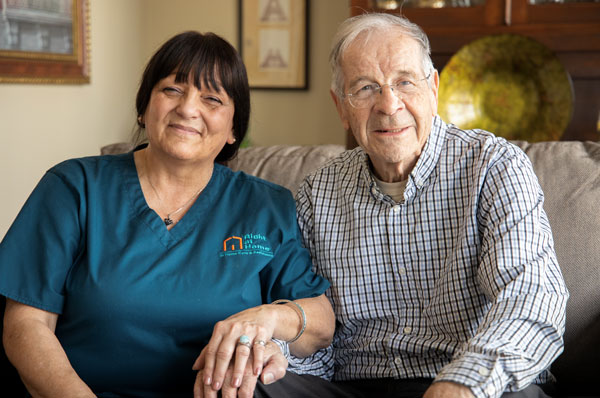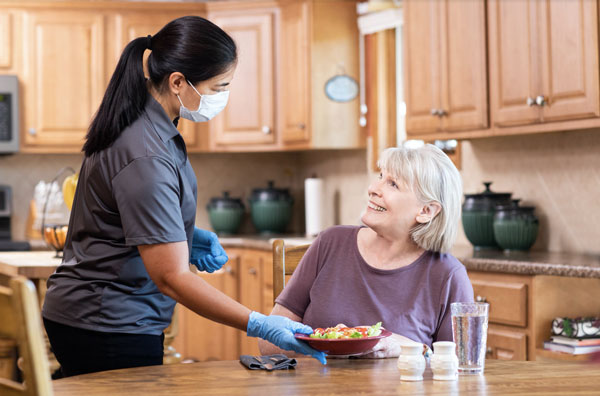How to Navigate a Loved One Resisting Senior Home Care

It can be a difficult decision to elect to get in-home care for a loved one. It’s hard to see our parents and family aging. Once you’ve noticed your elderly loved one needs a little extra help, it’s time to have a conversation.
But, what do you do when a loved one says no to in-home care or pushes back against any help at all?
Choosing to accept additional help can be difficult for your loved one. Meanwhile, you likely care very deeply for their wellbeing. This collision of emotions can lead to tension and disagreements if not appropriately handled.
What to Avoid When Discussing Senior Home Care
With emotions high, it can be challenging to feel like you’re on the same page. While you both want what’s best, it can be hard to communicate your goals and feelings. A few common scenarios play out when an elderly loved one and their family butt heads.
Arguing and being confrontational. When your loved one first pushes back against in-home care, you might feel the need to argue and explain why you know what’s best. Unfortunately, all this does is erode your trust and cause tension. Try to avoid being confrontational. This decision is an important life choice, not an argument to be won.
Taking charge and avoiding a loved one’s wishes. If you are worried about your loved one, but they say no to in-home care, you may think you are doing what’s best for them by choosing care anyway. Steamrolling over your loved one’s wishes is another strategy that erodes trust and can make it difficult to collaborate with your loved one. Always consider what your loved one thinks about the situation, and be sure to highlight how their feelings matter.
Giving in and letting your loved one decide. If you make a recommendation to your loved one for care and they say no, it might feel tempting to give up altogether and let them decide. While it is important to let your loved one weigh in on care decisions, someone must ensure they get the care needed. Choosing to walk away entirely or just let your loved one do what they want can be dangerous if they’re unwilling to get the help they need.
Ditch the Guilt About Senior Care Decisions
As your loved one is no longer able to care for themselves on their own, you may be feeling guilty about how much you’re able to help out. Individuals should never feel guilty about electing to get in-home care from professionals.
It isn’t uncommon for family members to feel like they have to do it all for their loved ones. However, caring for an elderly loved one is an enormous commitment and not one to take lightly.
Often, the perception of in-home care is vastly different from reality. Many seniors aren’t sure what to expect or imagine the worst possible outcome. In reality, in-home care is a positive experience, especially when your loved one gets a say in the situation. In-home care ensures your loved one gets the attention and professional help they need, which can be difficult to do on your own.

Ideal Strategies for Successfully Discussing In-home Care
The best way to talk about in-home care with your elderly loved one is to have an honest and transparent conversation. First and foremost, approach the conversation with empathy. No longer being able to care for yourself can be scary and emotional.
There are many reasons your loved one may be dreading an in-home care decision, such as a fear of:
- Losing control
- Change
- Financial instability
- Being negatively perceived by others
Use the trust and rapport you have with your loved one to show how much you care. Focus on really understanding the reasoning behind your loved one’s decision. Don’t fight them, instead focus on finding a solution that aligns with their needs and desires.
Supporting Your Loved One
Preserving trust and your relationships should be your priority, not winning an argument. Remember to be patient and show your loved one that you’re on their side. It can take time to get on the same page. Talking everything out and working to find a solution that overcomes any fears will demonstrate your support.
If you’re having a hard time communicating with your loved one or if things start getting too heated, enlist help from someone you trust.
Right at Home Milwaukee provides Senior Home Care services to seniors all across Milwaukee. With Senior Home Care, your loved one receives care in an environment they’re familiar with and comfortable in. Each plan is customized to ensure we meet the needs of each individual. Explore our services to learn more about how Right at Home Milwaukee can help your loved one.




